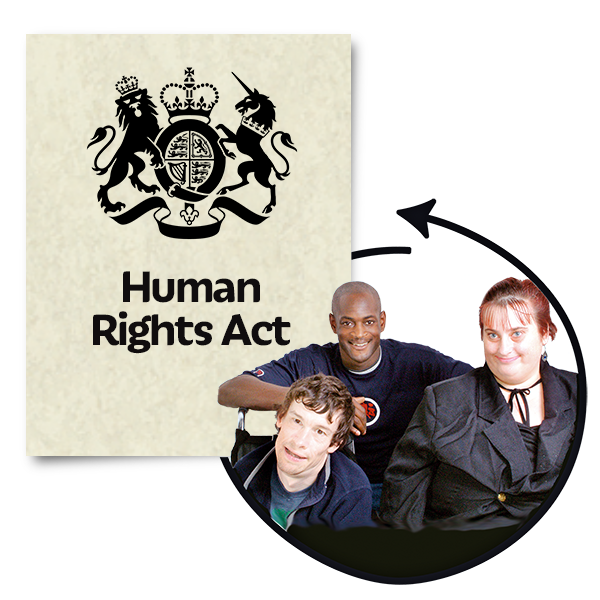Thousands of people with a
learning disability
 A learning disability is to do with the way someone's brain works. It makes it harder for someone to learn, understand or do things.
and/or
autism
A learning disability is to do with the way someone's brain works. It makes it harder for someone to learn, understand or do things.
and/or
autism
 Autism is a disability. Autistic people find it difficult to understand what other people think and feel. They also find it difficult to tell people what they think and feel. Everyone with autism is different.
have been locked away in modern-day asylums at increased risk of abuse despite Government promises following a shocking hospital abuse scandal, survivors’ families and charities Mencap and the
Challenging Behaviour
Autism is a disability. Autistic people find it difficult to understand what other people think and feel. They also find it difficult to tell people what they think and feel. Everyone with autism is different.
have been locked away in modern-day asylums at increased risk of abuse despite Government promises following a shocking hospital abuse scandal, survivors’ families and charities Mencap and the
Challenging Behaviour
 Challenging behaviour can be when someone hurts themselves, hits or pinches someone else, or breaks something. Some people might behave like this because they are upset or because people do not understand them.
Foundation (CBF) have revealed today in a new casebook.1
Challenging behaviour can be when someone hurts themselves, hits or pinches someone else, or breaks something. Some people might behave like this because they are upset or because people do not understand them.
Foundation (CBF) have revealed today in a new casebook.1
At least 2,040 people are still locked away in mental health hospitals, often many miles from home.2 Families and charities warn that they are in danger of physical and emotional abuse.
The charities’ analysis shows that there have been at least 102,010 recorded reports of restrictive practices, like physical restraint, chemical cosh and solitary confinement, since October 2018 when figures were first reported. This is equivalent to one used every 12 minutes. Mencap and CBF say these figures are likely to be ‘the tip of the iceberg’ due to low numbers of hospitals providing data, despite it being
mandatory
 Mandatory means that something must be done.
.3
Mandatory means that something must be done.
.3
The horrifying figures come ten years, this month, since a BBC Panorama undercover investigation at Winterbourne View Hospital, near Bristol, aired. Viewers were shocked to see footage of disabled people repeatedly being pinned down, slapped, dragged into showers while fully clothed, taunted and teased. Although the private hospital closed and several staff members were charged with criminal offences, families of the survivors have spoken out about their ongoing worries about these institutions.4
Today, six families have shared their own personal accounts of the impact on their loved ones after being locked away at Winterbourne View in a casebook to mark the anniversary.1 They make clear their outrage that people are still being admitted and poor treatment is still widespread.5 Despite Government promises to reduce the number of people locked away in these units,6 there have been 9,490 admissions – equivalent to 4 a day – since its Transforming Care Programme began in 2015.7
While some Winterbourne View survivors have flourished in their communities with the right social care support, many have experienced long-term side effects of being at Winterbourne View, such as post-traumatic stress disorder, anxiety and meltdowns. Families live in fear that, without specialist social care support in the
community
 A community is the people and places in an area.
to meet their loved one’s needs, they are at risk of readmission into an inpatient unit. Shockingly, some Winterbourne View survivors continue to be locked up in modern-day asylums today.
A community is the people and places in an area.
to meet their loved one’s needs, they are at risk of readmission into an inpatient unit. Shockingly, some Winterbourne View survivors continue to be locked up in modern-day asylums today.
Ann Earley, mother to Simon, now 47, who was at Winterbourne View hospital between 2010-2011, says: “When there was a shockwave of horror after the abuse of our sons and daughters was aired on national TV, we naively hoped that the promises made by government would change the system forever. Yet, here we are 10 years on still having to fight.
“For many, the promised support failed to come, not just for our loved ones, but for their families who were also left traumatised by the events. Our loved ones were left struggling within a failing system and some were re-admitted, commencing the sad, sorry cycle again and again.
“The failure to extricate people entrenched within the system is pathetic, but it is the failure to stop others being pulled in that’s even worse. The dangers have been exposed, the failures noted, the appalling damage catalogued but still decision-makers and commissioners condemn our loved ones to a life of misery. Still other settings like Winterbourne Views are built and their beds filled. There should never be the opportunity for another Winterbourne View to be created under the guise of providing care.”
Figures also show that more than one in six people currently in an inpatient unit have been there since before the Winterbourne View abuse was exposed in 2011. On average, current inpatients stay for more than 5 years. A lack of appropriate housing and social care services in the community are the main reasons for delayed discharges.2
The families have joined together to write a letter to the
Prime Minister
 The Prime Minister is the leader of the government.
, Boris Johnson, demanding action and deliver “real, enduring change” to stop this domestic
human rights
The Prime Minister is the leader of the government.
, Boris Johnson, demanding action and deliver “real, enduring change” to stop this domestic
human rights
 Human
rights
Human
rights
 Rights are the things everyone should be allowed to do like have a say, or go to school.
are the rights that everyone has. These include the right to go to school and the right to start a family.
scandal.8 They, alongside Mencap and CBF, are calling for his Government to:
Rights are the things everyone should be allowed to do like have a say, or go to school.
are the rights that everyone has. These include the right to go to school and the right to start a family.
scandal.8 They, alongside Mencap and CBF, are calling for his Government to:
- Immediately publish the cross-government action plan on Transforming Care, which was promised in response to a 2019 Joint Committee on Human Rights’ report,9 and ensure it has a strong focus on preventing admission;
- Provide ongoing support for people and their families who have been traumatised by the inpatient system;
- Properly fund specialist social care in the community to stop more people from being admitted in the first place and get those who are still locked away out.
Kayleigh, 35, has a rare chromosome deletion and was an inpatient in Winterbourne View hospital. She now lives in the community with her own support package. She says: “Everything is better. I have freedom. I’m not being told when I can eat. I’m not being put in isolation if I’m a little bit upset. I’m able to do whatever I want.”
Edel Harris OBE, Chief Executive of the learning disability charity Mencap, says: “It is unforgivable that over the last decade the Government has broken promise after promise which has left people with a learning disability and/or autism stuck living in assessment
An assessment is a way of finding out what help a person needs. When you have an assessment, you might have to go to a meeting or fill in a form. and treatment units when they should be living at home. For people and their families to have been through such horrors and for so little to have changed is deplorable.
“There has been abuse scandal after abuse scandal in mental health hospitals up and down the country, and it is highly likely that abuse still occurs in many of these institutions today. With restrictive and inhumane treatment reportedly being used against people once every 12 minutes, the Government really needs to address the urgency of this situation.
“We cannot tolerate a situation where more people are locked up simply because they cannot access appropriate support in their community. It’s widely known that improving access to early intervention and personalised support in many cases can be the solution. The Prime Minister must listen to the families of those who were at Winterbourne View and act now before more people are abused and lives destroyed.”
Vivien Cooper OBE, CEO of the Challenging Behaviour Foundation, says: “The messages from the families who have shared their experiences 10 years after the abuse at Winterbourne View was exposed are stark and clear – however you look at it, care has not been transformed. Think what can be achieved in 10 years – then consider how little has changed for so many people with learning disabilities and autistic people whose behaviour challenges. I hope that those in positions of power and influence, those who have high status and whose job it is to deliver the transformation of care, read these accounts and reflect on the devastating and lasting impact inappropriate admission has on children, adults and families – and how that impact and the consequences continue, year in, year out. We know what to do, what works, and how to do it – we need strong leadership, and people with the will, skills and determination to make this a priority and take action.”
- Ends –
For further information or to arrange interviews, contact Mencap’s media team on:
- media@mencap.org.uk
- 020 7696 5414 (including out of hours).
Notes to editors
- Six families of Winterbourne View survivors, supported by the charities Mencap and the Challenging Behaviour Foundation, have published the casebook, “Tea, smiles and empty promises: Winterbourne View and a decade of failures – a collection of family stories” to mark 10 years since the hospital abuse scandal was exposed. The casebook also includes families’ stories about other people who have been trapped in the inpatient system in the intervening years. The families, in order of their stories’ appearance in the casebook, are: Lorretta, mum to Dan, Ann Earley, mum to Simon, Claire Garrod and Emma Austin-Garrod, mum and sister to Ben, Wendy Fiander, mum to Kayleigh, Leslie, dad to Leslie Junior, and Steve Sollars, dad to Sam.
- Mencap and CBF have used NHS Digital’s Assuring Transformation data, which is the most accurate and up to date account of people with a learning disability and/or autism in inpatient units. Key data collected includes number of admissions, length of stay, and what kind of unit they are in. Latest data shows that numbers have fallen from the Government’s baseline of 2,890 at the end of March 2015 to 2,040 at the end of April 2021, a 29% reduction in the number locked away since the start of the Government’s Transforming Care plan: https://digital.nhs.uk/data-and-information/publications/statistical/learning-disability-services-statistics/learning-disability-services-monthly-statistics-at-april-2021-mhsds-february-2021-final/datasets---at.
- Mencap and CBF have used NHS Digital MHSDS Data to calculate these figures for restrictive practices used against people with a learning disability and/or autism in inpatient units. These figures refer to the number of recorded instances of restrictive practices reported between October 2018, when NHS Digital first reported this data, and February 2021, the latest data. Please note some of these interventions may together combine to count as one restrictive intervention episode, i.e. multiple types of intervention could be used at once. For more information visit: https://digital.nhs.uk/data-and-information/publications/statistical/learning-disability-services-statistics.
- On 31st May 2011, BBC Panorama’s undercover investigation into the NHS-funded private hospital, Winterbourne View, revealed people with a learning disability and/or autism being physically and mentally abused by those paid to care for them. Footage showed staff slapping patients, pinning them under chairs, force-feeding them medication and tormenting them. The mistreatment of the people locked away at Winterbourne View shocked the nation. Eleven care workers were charged over the abuse, six went to prison.
- Since Winterbourne View, there have been further scandals exposed at other hospitals, most notably another BBC Panorama investigation into Whorlton Hall hospital. An increasing number of inpatient units have been rated inadequate by the CQC – currently 13% up from 4% on the previous year. The CQC has also recently taken enforcement action against some inpatient providers for not being safe.
- Following the Winterbourne View hospital abuse scandal, the Government promised to get everyone inappropriately placed in these hospitals out no later than 1st June 2014. This deadline passed and in 2015, the Government and NHS England launched the ‘Transforming Care’ programme and the ‘Building the Right Support’ national plan which committed to closing 35-50% inpatient beds by March 2019 and supporting people to return home. This target was missed twice and still has not been met. The Government has since promised to reduce the number of people locked away in inpatient units by 50% by 2024.
- Mencap and CBF have used the Assuring Transformation data from NHS Digital to calculate the number of admissions or readmissions between March 2015, the start of the Government’s Transforming Care programme, and April 2021, the latest dataset. Figures for admissions exclude data relating to hospital transfers. For more information visit: https://digital.nhs.uk/data-and-information/publications/statistical/learning-disability-services-statistics.
- See the families’s letter to the Prime Minister here.
- See the Government’s response to the 2019 Joint Committee on Human Rights’ report where it committed to “publish a Building the Right Support Action Plan”: https://committees.parliament.uk/publications/3159/documents/29326/default/
- Mencap and the Challenging Behaviour Foundation have been campaigning with families on these issues since the abuse scandal at Winterbourne View ten years ago.
- Mencap and the Challenging Behaviour Foundation are asking the Government to focus on:
- Developing local expertise, support and services
- Ensuring there is joint oversight and ownership of the national programme by the Ministers from the Department of Health and Social Care, Ministry of Housing, Communities and Local Government and Department for
Education
 Education is when you learn things. When you fill in a form to get a job, education means you write where you went to school, college or university.
.
Education is when you learn things. When you fill in a form to get a job, education means you write where you went to school, college or university.
. - Removing the red tape and funding barriers that are preventing so many people from returning home.
- A robust plan from leadership for cross-government working.
About Mencap
There are 1.5 million people with a learning disability in the UK. Mencap works to support people with a learning disability, their families and carers by fighting to change laws, improve services and access to education,
employment
 Employment means having a job.
and
leisure
Employment means having a job.
and
leisure
 Leisure is when you have time to do things you enjoy like playing sports or going to the pub.
facilities. Mencap supports thousands of people with a learning disability to live their lives the way they want. www.mencap.org.uk.
Leisure is when you have time to do things you enjoy like playing sports or going to the pub.
facilities. Mencap supports thousands of people with a learning disability to live their lives the way they want. www.mencap.org.uk.
For advice and information about learning disability and Mencap services in your area, contact Mencap’s Freephone Learning Disability Helpline on 0808 808 1111 (10am-3pm, Monday-Friday) or email helpline@mencap.org.uk.
What is a learning disability?
- A learning disability is a reduced intellectual ability which can cause problems with everyday tasks – for example shopping and cooking, or travelling to new places – which affects someone for their whole life;
- Learning disability is NOT a mental illness or a learning difficulty, such as
dyslexia
 Dyslexia is a learning difficulty. People who have dyslexia can find it hard to read, write and spell.
. Very often the term ‘learning difficulty’ is wrongly used interchangeably with ‘learning disability’;
Dyslexia is a learning difficulty. People who have dyslexia can find it hard to read, write and spell.
. Very often the term ‘learning difficulty’ is wrongly used interchangeably with ‘learning disability’; - People with a learning disability can take longer to learn new things and may need support to develop new skills, understand difficult information and engage with other people. The level of support someone needs is different with every individual. For example, someone with a severe learning disability might need much more support with daily tasks than someone with a mild learning disability.
About The Challenging Behaviour Foundation
The Challenging Behaviour Foundation (CBF) is a charity which exists to demonstrate that individuals with severe learning disabilities whose behaviour challenges can enjoy ordinary life opportunities when their behaviour is properly understood and appropriately supported.
The CBF supports families across the UK caring for individuals with severe learning disabilities. Information and support around understanding challenging behaviour and supporting behaviour change is provided through a range of written and DVD resources, email networks, family linking scheme, and through individual telephone support.
For more information about the CBF’s work on restraint and seclusion: https://www.challengingbehaviour.org.uk/what-we-do/strategic-influencing/restraint-seclusion-and-medication.
www.challengingbehaviour.org.uk
Tel: 01634 838739
Signposting for people and families affected by this issue
If you are worried that someone you know with a learning disability and/or autism is at risk of admission to an inpatient unit, or is currently in an inpatient unit and you are concerned about their care, please see the following for information for support:
- Challenging Behaviour Foundation Helpline: 0300 6660126 or email support@thecbf.org.uk
- Mencap’s Freephone Learning Disability Helpline: 0808 8081111 or email helpline@mencap.org.uk
- National Autistic Society’s Autism Inpatient Mental Health casework service: https://www.autism.org.uk/what-we-do/help-and-support/autism-inpatient-mental-health-service
- Resources:
Challenging Behaviour Foundation https://www.challengingbehaviour.org.uk/information-and-guidance/when-things-go-wrong/
National Autistic Society www.autism.org.uk/advice-and-guidance/topics/inpatient-mental-health-hospitals/autistic-people-and-inpatient-mental-health-hospit